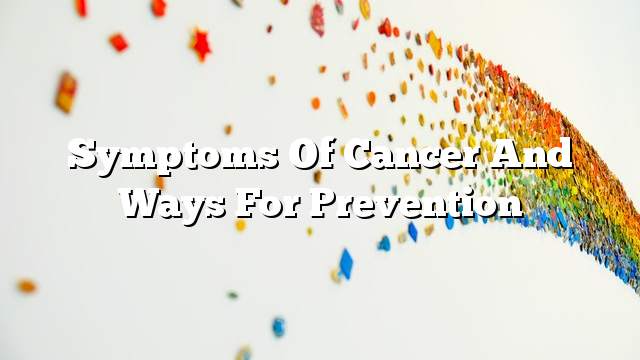cancer
Cancer is one of the most common causes of death in the United States, according to studies conducted by the American Cancer Society. The death rate Resulting in cancer about 25% of deaths in America. In fact, there are more than 100 types of cancers, and classified cancers depending on the cells first hit. It is worth mentioning that the most common places of cancer in men are the lungs, prostate, rectum, colon, stomach and liver. In women, cancer often appears in the breast, rectum, stomach, lungs, colon, and cervix.
Symptoms of cancer
The appearance of any strange presentation or sign in the body calls for medical assistance for fear of cancer. Although some symptoms may be obvious, such as lump or bump, some symptoms and signs may be difficult to know It is worth noting that suffering from one of these symptoms does not necessarily mean cancer, and these symptoms and signs include the following:
- Breathing difficulty: Some people often have difficulty breathing for some time, but if it happens more than usual or for a longer period of time than normal, cancer may be the cause of the problem.
- Unwarranted vaginal bleeding: Some women may experience mild hemorrhage from one session to the next due to taking oral contraceptives, but you should see your doctor when you notice vaginal bleeding after reaching menopause, after sex, or between menstrual cycle and other.
- Severe sweating during sleep: Although some suffer from severe sweating during sleep due to infection, as a side effect of certain medications, or as a natural symptom of menopause, excessive sweating to the point of wetting clothes may be a symptom of cancer.
- The appearance of an abnormal mass or bulge: Check with your doctor when you notice a lump or permanent swelling anywhere in your body, such as an armpit, stomach, neck, groin, chest, breast, or testicles.
- Unjustified Pain: Suffering from pain, especially with age, is normal, but the continuous onset of pain, or the continuous onset of pain, calls for a doctor’s review.
- Continuous cough: Cough is a natural symptom of colds, but if the cough is too severe or lasts for a long time, this requires telling the doctor.
- Blood Cough: The presence of blood in the cough may not indicate any health problems, but should be reviewed by the doctor when you notice.
- Change of hole or mole: The presence of a mole is normal, but you should see your doctor for a change in their shape, color, size, and when you see blood coming out.
- Unconscious weight loss: Losing weight unintentionally requires a doctor.
- Problems with urination: Some problems may arise during urination, such as pain, urgent urination, frequent urination, etc. These problems may be symptoms of health problems other than cancer, but may also appear as cancer. It is worth mentioning that the appearance of blood in the urine requires the necessary tests, despite the rare occurrence of cancer.
- Blood appearance in the stool: Although the appearance of blood in the stool is often caused by hemorrhoids, it may also occur in cancer.
- Breast abnormalities: The symptoms of cancer in the breast are not limited to the appearance of small lumps in it, but may be noticed redness, or change in shape, color, size, or texture, or discharge secretions of the nipple in times of absence of pregnancy and lactation.
- Change in bowel movement: Although most of the causes of bowel movement are due to food poisoning, cancer may cause a change. Cancer patients may suffer from constipation, feces, or stool changes to become less rigid.
- Difficulty swallowing: Swallowing difficulty is a real problem if it persists and does not recover quickly, and may indicate the presence of cancer.
Cancer prevention
In fact there is no specific way to prevent cancer, but there are some tips recommended by doctors to reduce the risk of cancer, and these tips include:
- stop smoking: Smoking increases the risk of various cancers, including lung cancer, and smoking cessation reduces the risk of cancer in the future.
- Healthy eating: Healthy eating is recommended to reduce the risk of cancer, such as fruits, vegetables, whole grains, and low-fat proteins.
- Exercise: Exercising most days of the week at a rate of 30 minutes a day reduces the risk of cancer. It should be noted that people who are not accustomed to exercise should exercise slowly and moderately, and gradually increase until the desired goal.
- Maintain a healthy weight: Weight gain and obesity increase the risk of cancer, so it is recommended to maintain a healthy and ideal weight by eating healthy and exercising.
- Avoid excessive exposure to sunlight: Excessive exposure to the sun may cause exposure to some harmful rays, so it is recommended to wear clothes, sit in the shade, and put the sun visor when exposed to the sun.
